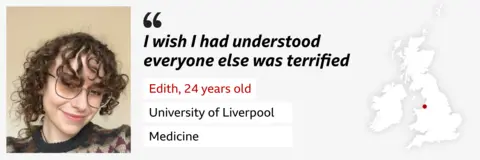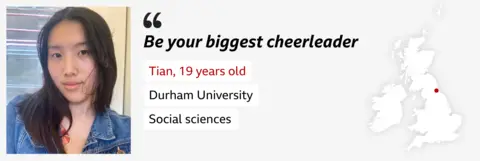Education
What I wish I knew before going to university

 BBC
BBCOver the next couple of weeks, hundreds of thousands of new students will descend on universities around the country.
For many, this will mark the start of a brand new adventure – though one often filled with a lot of worry.
To help with nerves, BBC News asked for tips from 2024’s first-years, who’ve already sussed out being freshers.
From balancing studies and social life, to looking after your mental health and the importance of doing the washing up, this is what the class of 2024 have to say to the new kids on the block.

Edith Adam says she was “terrified” when she moved to Liverpool last year to study medicine.
What she hadn’t realised at the time was that other freshers were just as scared as she was.
“I was absolutely terrified about not being able to make friends or that people wouldn’t like me,” says Edith, who’s now going into her second year.
“I wish I had understood everyone else was terrified, and that they appreciate it when you go up to them and say hi.”
 Edith Adam
Edith AdamHaving never been to Liverpool before – a city with a party reputation – Edith worried she might not fit in.
“I was really scared of being ostracised for not wanting to go clubbing every night and not being a drinker,” she says.
But Edith was still able to find her people.
“No one actually cares. There are plenty of things you can do that don’t revolve around late nights. Just find what works for you.”
 Edith Adam
Edith AdamThe 24-year-old, from Huddersfield, says her advice would be not to put too much importance on the infamous freshers’ week.
“I think everyone goes in with the expectation that it’s this amazing, wild week, where you meet your best friends for life and have your best time at uni,” she says.
And her top tip for staying friends with your flatmates?
“If it takes less than two minutes, just do it,” Edith says. “It’s so easy for everything to pile up, and then you don’t wash your plates for five days, and all of a sudden everything is dirty and you have no cutlery – and your flatmates hate you.”

But what if you can’t make freshers week?
This is the situation Konstantin Schmidt faced last year, after issues with his visa delayed his start at Greenwich University by five weeks.
Although people told him the freshers parties he’d missed out on were “fun”, the mechanical engineering student says he still managed to settle in well by joining up to student clubs.
“Societies are the best way to find people who share the same passion,” Konstantin says.
 Konstantin Schmidt
Konstantin SchmidtJoining both a volleyball society and the Formula One society, he says he had positive interactions right from the off.
“The second I joined the room the members saw I was new and instantly included me,” Konstantin says. “I also met new people through volleyball who were on my course who quickly became my friends.”
 Konstantin Schmidt
Konstantin SchmidtThe 21-year-old bonded with his flatmates by exploring each other’s culture through food and music.
In his first weeks, Konstantin, who’s from Bavaria in Germany, made Spätzle – a pasta dish topped with grilled cheese for a dinner party with his flatmates.
“Everyone really liked” his food, he says – but he admits the best dish was a Filipino one made by his flatmate, Kai.
“It helped us understand everyone’s culture even better,” Konstantin says.

While many people starting university will be living away for the first time, some students still live at home.
Commuting more than an hour each way between Glasgow and Edinburgh, Rebecca can relate.
“If they forget something, my friends can just nip back to their accommodation, whereas I can’t, ” she says. “But it’s not bad, I like commuting in.”
Going into her second year of a business management course, Rebecca is now much more organised and comfortable with the journey, after experiencing some hiccups in her first year.
 Handout
HandoutIn some cases, cancelled trains meant she had to pay for a taxi all the way to Edinburgh.
“In second year I will definitely be checking my trains,” Rebecca says.
Her advice for freshers is simple: “Make sure your bag is fully packed with everything you might need – and plan your commute.”
Rebecca’s university experience has been different from many others as she was only 16 when she started her course.
“I thought everyone was going to be older and not want to speak to me,” she says. “But it wasn’t like that at all. The age gap doesn’t really matter.”
 Handout
HandoutNow 17, Rebecca is still waiting to experience a full freshers’ week, but says she was still able to attend under-18 events.
Her advice for those in a similar position?
“Don’t be afraid to ask for help,” she says. “I felt like I couldn’t ask for help because people would think I didn’t deserve to be there because I’m younger.
“They don’t care that you’re 16 or 17. Just ask for help.”

As the first in her family to go to university, Tian Liu didn’t know what to expect before she started her combined honours degree in social sciences.
“I did so much research, but I still felt so unprepared,” Tian says. “University is definitely a roller coaster. There was a point I wanted to drop out, but now I can definitely see the fruits of my labour.”
 Tian Liu
Tian LiuNow going into her second year, the 19-year-old has found a better balance and would advise incoming students to look after their mental health.
“With tuition fees rising there is such a pressure to make the most out of it, but you can burn out,” Tian says. “University is as much as you make of it, but give yourself grace.
“Have close friends who can act as support and accountability if you are doing too much, and use pastoral teams that the university offers,” she adds.
“There is no need to rush, it’s all a constant learning curve.”
 Tian Liu
Tian LiuOne year on from moving to Durham from Leeds, Tian is in New York completing an internship she got through her university – something she “could never have imagined” last year.
Her advice for incoming students?
“Don’t disqualify yourself from anything. Be your biggest cheerleader. And take so many photos.”
Education
How to manage a part-time job alongside your student workload … and boost your CV at the same time | University guide

If you’re planning to go to university, you may also be thinking about getting a job while studying. But it can be difficult to know where to look, especially if you’re moving to an unfamiliar city.
The most important thing is to find a job that’s flexible enough to fit alongside your studies. With the third term increasingly quiet or even empty you might consider filling it with temporary work – but remember your main goal is to get a degree that opens the door to the career you want. Many universities, including Edinburgh, Birmingham and Brunel, recommend working no more than an average of 15 hours a week during term time so that your studies aren’t compromised.
Aside from the usual job search platforms such as LinkedIn, Indeed and Reed, there are other sites worth a look if you want flexible work either during term time or the holidays. Jobtoday, Caterer, E4s, StudentJob and JobsBear all list jobs around the UK, including casual work.
As well as searching on job sites, you could contact local catering companies – they often let you pick up waitering shifts as and when they suit you. From October, Christmas temp roles are worth looking out for as many retail and hospitality companies will be offering flexible working contracts during this time.
Working for a chain that has branches around the country is great because it can give you the flexibility of transferring to another outlet when moving between home and university and vice-versa.
When you get to university, your campus will have an employability or careers team. They should be able to give you guidance on finding jobs in the area, as well as helping you with your CV and cover letter.
Even if the role does not match what you hope to do for a living post-university, having a job while studying will equip you with essential life skills. All jobs involve being organised and punctual, many will help you build resilience and your communication skills as you deal with different people and situations.
Roles such as restaurant work can have great transferable skills such as conflict resolution (dealing with awkward customers), building rapport (with colleagues and not-awkward customers) and being able to work well under pressure. These will all serve you well on your CV.
“Increasingly, major graduate employers are prioritising skills over academic qualifications when selecting candidates,” says Claire Tyler, head of insights at the Institute of Student Employers, the biggest UK student recruitment community.
“We recommend students research the skill requirements of the graduate employers they may wish to apply to after university and then seek part-time work which will help demonstrate these skills.
“Developing skills during part-time employment work is an accessible way students can ensure they stand out in a competitive graduate job market.”
Education
No alcohol? No problem: how to make friends at university without booze | Universities

For as long as anyone can remember, drinking has been a key part of the student experience – but this is changing. An increasing number of young people are turning away from drinking, with a 2024 poll by Student Beans finding that half of first-year students did not plan to drink during their freshers’ week.
If you’re considering a teetotal uni experience, or want to limit your drinking, here are four places to look for sober fun.
Societies
One of the easiest ways to find like-minded people and make friends without alcohol is to join any society that you’re interested in. There are more than 10,000 societies across all universities in the UK, with at least 50 to choose from at most universities, many of which do not involve alcohol.
Georgia Burdis, a vice-president of activities at Northumbria University, says that for “students who don’t drink, university can still be a very rewarding social experience when you find the right spaces” and advises teetotal students to “seek out communities that align with your intentions rather than the social norms of alcohol consumption. This way you will naturally build meaningful friendships”.
Parties
It is absolutely possible to go to parties where people are drinking and still have fun while sober. Although it might be outside your comfort zone, try at least one to find out if you enjoy it.
If you want to go to a party with other people like yourself, there is a surprising amount of choice. Sober parties have fast become normalised, with events spreading across the country. In Glasgow, for example, Good Clean Fun puts on monthly ticketed events that combine a variety of musical genres with activities such as meditation.
Enjoy the outdoors
A study by the Mental Health Foundation found that 39% of students did not do regular exercise, often citing tiredness and a preference for socialising. So how about combining looking after your health with making friends in the process?
Most universities will have great sportsfacilities and a plethora of teams you can join, with something to suit all ability levels. Ask at your fresher’s fair to find the perfect fit.
For something more intrepid, outdoor societies such as Dundee University’s Rucksack club, the University of Plymouth’s Adventure & expo group and the University of London Mountaineering club take advantage of the local countryside and are open to people of all backgrounds and experience levels.
Games
You might think only mature students would enjoy playing board games – but you’d be wrong. One study by Edge Hill University (pdf) found that 26.9% of board game players are between the ages of 18 and 25.
There are a surprising number of games clubs and campus societies dedicated to them. Edge Hill has several, including the Poker and card games society, which says new members should “feel free to bring along any card game you wanna play and I’m sure we’ll enjoy playing too!”.
Education
FIORENTINO: STATE SYSTEM WILL TACKLE AI EDUCATION

In his new blog, State System of Higher Education Chancellor Christopher Fiorentino highlights an agreement signed with Google last week “to help students develop the AI competencies they will need in their future careers.” Writing that the State System can’t fool itself into thinking artificial intelligence is a “trend” or a “passing fancy,” Fiorentino pledges to enter the future with “eyes wide open.” He says perhaps the best contribution the state-owned universities can make is to ensure graduates know “what AI tools they should be prepared to use” as they start their careers.
The agreement to expand the State System’s partnership with Google includes IUP, Cheyney, East Stroudsburg, PennWest, and Millersville..
THE CHANCELLOR’S BLOG:
https://chancellorfiorentino.blogspot.com/2025/09/ai-is-not-fad.html
.
-

 Business2 weeks ago
Business2 weeks agoThe Guardian view on Trump and the Fed: independence is no substitute for accountability | Editorial
-
Tools & Platforms1 month ago
Building Trust in Military AI Starts with Opening the Black Box – War on the Rocks
-

 Ethics & Policy2 months ago
Ethics & Policy2 months agoSDAIA Supports Saudi Arabia’s Leadership in Shaping Global AI Ethics, Policy, and Research – وكالة الأنباء السعودية
-

 Events & Conferences4 months ago
Events & Conferences4 months agoJourney to 1000 models: Scaling Instagram’s recommendation system
-

 Jobs & Careers3 months ago
Jobs & Careers3 months agoMumbai-based Perplexity Alternative Has 60k+ Users Without Funding
-

 Podcasts & Talks2 months ago
Podcasts & Talks2 months agoHappy 4th of July! 🎆 Made with Veo 3 in Gemini
-

 Education2 months ago
Education2 months agoVEX Robotics launches AI-powered classroom robotics system
-

 Education2 months ago
Education2 months agoMacron says UK and France have duty to tackle illegal migration ‘with humanity, solidarity and firmness’ – UK politics live | Politics
-

 Funding & Business3 months ago
Funding & Business3 months agoKayak and Expedia race to build AI travel agents that turn social posts into itineraries
-

 Podcasts & Talks2 months ago
Podcasts & Talks2 months agoOpenAI 🤝 @teamganassi


